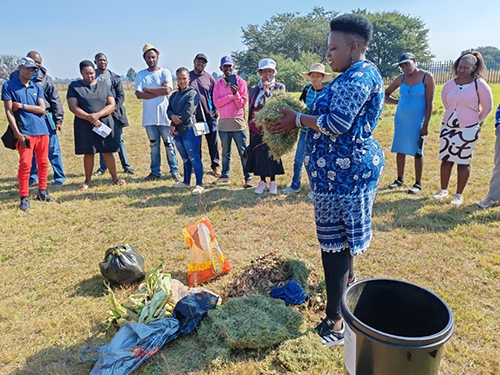Gauteng
Advocating for wetland protection and sustainable farming
The Unisa Teacher Education and Interdisciplinary Research Conference recently showcased groundbreaking research emphasising the need for harmony between human and non-human species.
The presentation titled: "Facilitating a transdisciplinary approach in the promotion of living and non-living things balance," led by Pat Lethole, Centre Manager of the Ekurhuleni Centre, and Dr Enid Bunki Pitsoane, Head of Counselling at Unisa, underscored the critical need to balance human activities with the natural world to tackle challenges like climate change, food and water insecurity, and the degradation of living and non-living things relationships.

Connie Mbodi demonstrates the making of compost.
The conference, organised by Lethole and Connie Mbodi, an educator from the Participatory Guarantee System (PGS), took place in Daveyton. It aimed to teach community members how to create organic compost for farming and business purposes. The initiative, in collaboration with colleagues from the College of Education (CEDU), is part of a larger systemic action learning approach supporting the green circular economy by promoting relationships between living and non–living species relationships through a community of practice. Lethole said: "The community of practice promotes the interplay between living and non-living entities. As a result, the community members in Daveyton learned how to create organic compost for their farms and businesses."
Key findings and insights
The research presented at the conference revealed that engaging communities and universities in exploring practices that regenerate life-forces is helpful. Moreover, it transpired that balancing indigenous knowledge with Western scientific approaches promotes the local economy. The collaboration between Unisa, the University of Venda, the University of Adelaide, and other institutions aims to integrate indigenous and Western knowledge systems.
Pitsoane explained: "The research will impact teaching and learning practices by balancing indigenous and Western knowledge, documenting them to promote a local economy."
According to the various presenters, the next phase of their research involves systemic studies integrating indigenous and Western knowledge systems to foster harmonious relationships among different species. They agreed that this approach aligns with various United Nations Sustainable Development Goals (UNSDGs) and highlights Unisa Gauteng Region's dedication to promoting sustainable living practices that benefit both humans and the broader ecosystem.
As highlighted by Prof Puleng LenkaBula during the recent annual Research and Innovation Week, universities must transcend their roles as mere academic institutions and become beacons of knowledge accessible to all. Initiatives like "Making organic compost for sustainable farming" exemplify Unisa Gauteng Region's commitment to this vision, showcasing the dedication of staff members to creating meaningful impacts on human livelihoods and environmental sustainability.
Contributors to the project include Mokwale Mampe, Kgomotso Nyamakazi and Lehlohonolo (Hlony) Rakhomo.
*By Thembeka Ntuli-Mpapama, Manager, Communications and Marketing, Unisa Gauteng Region
Publish date: 2024/06/13
